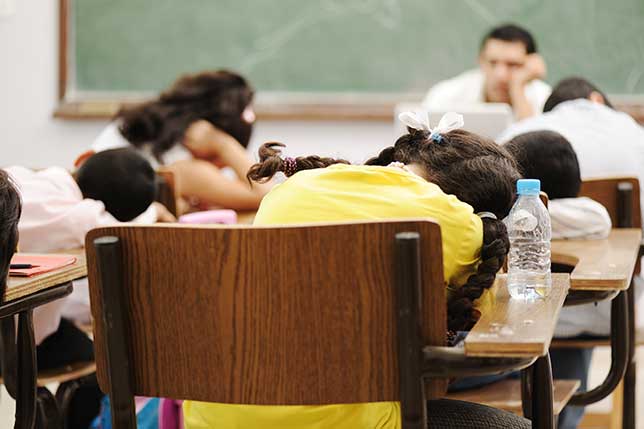Research: Early School Start Times Hurt Students, Hinder Performance
- By Dian Schaffhauser
- 09/09/15

How about starting high school at 10 a.m. and college at 11? That's among the recommendations from a new study examining the impact of early start times for students. Researchers from the University of Oxford, Harvard Medical School and the University of Nevada, Reno reported that students could improve their learning and have fewer health problems if schools accommodated the unique circadian rhythms of young people. In fact, the study they've published suggested that modifying start times would be less expensive than other kinds of interventions schools are using.
"A common belief is that adolescents are tired, irritable and uncooperative because they choose to stay up too late or are difficult to wake in the morning because they are lazy," the study noted. "Educators tend to think that adolescents learn best in the morning and if they simply went to sleep earlier, it would improve their concentration."
Not so, reported researchers in "Synchronizing education to adolescent biology: 'let teens sleep, start school later'." As they explained, the conflict between "social time" — the timetable by which we're expected to perform in work and school — and biological time is never greater than when we're adolescents. Young people need at least nine hours of sleep every night along with later wake and sleep times, the researchers wrote.
By forcing students to get up "too early in their circadian cycle," schools are "systematically restricting the time available for sleep and causing severe and chronic sleep loss." The result: "poor communication, decreased concentration and cognitive performance, unintended sleeps, decreased motor performance, increased risk taking and changes in mood pattern, specifically depression."
The researchers pointed to previous sleep study research in advising schools to consider synchronizing class start times to adolescent biology. At the age of 10, the "biological wake time" is about 6:30; so school should start between 8:30 and 9, the researchers wrote. At 16, the wake time is 8, so the school start time should be between 10 and 10:30. And at 18, the wake time is about 9, so the start time for classes should be between 11 and 11:30.
One school district tried that and liked what it found — at least for a time. Back in 1997 Minneapolis Public Schools shifted its high school start time from 7:15 to 8:40. The research on that program looked at data on 50,000 students collected before and after the start time was changed. "The self-reported student evidence indicated that students liked the change, slept an hour longer compared to students in two other similar school districts and reported their attendance, achievement, behavior and mood improved," the report stated. On top of that, the researchers added, nine in 10 parents were "very positive about the later start" and reported that their children "were easier to live with." Since then, start times at most of those high schools have reverted somewhat. While several start at 8:30, some start as early as 7:55.
Compared to other efforts to improve the health and learning of students, such as running smaller classrooms, changing the start time is a comparatively cost-effective approach, the researchers asserted. "The synchronization of education to adolescent biology enables immediate advances in educational attainment and can be achieved with a relatively simple step that does not require new teaching methods, new testing or large additional expenditure."
The research was published in the latest issue of Learning, Media and Technology.
About the Author
Dian Schaffhauser is a former senior contributing editor for 1105 Media's education publications THE Journal, Campus Technology and Spaces4Learning.